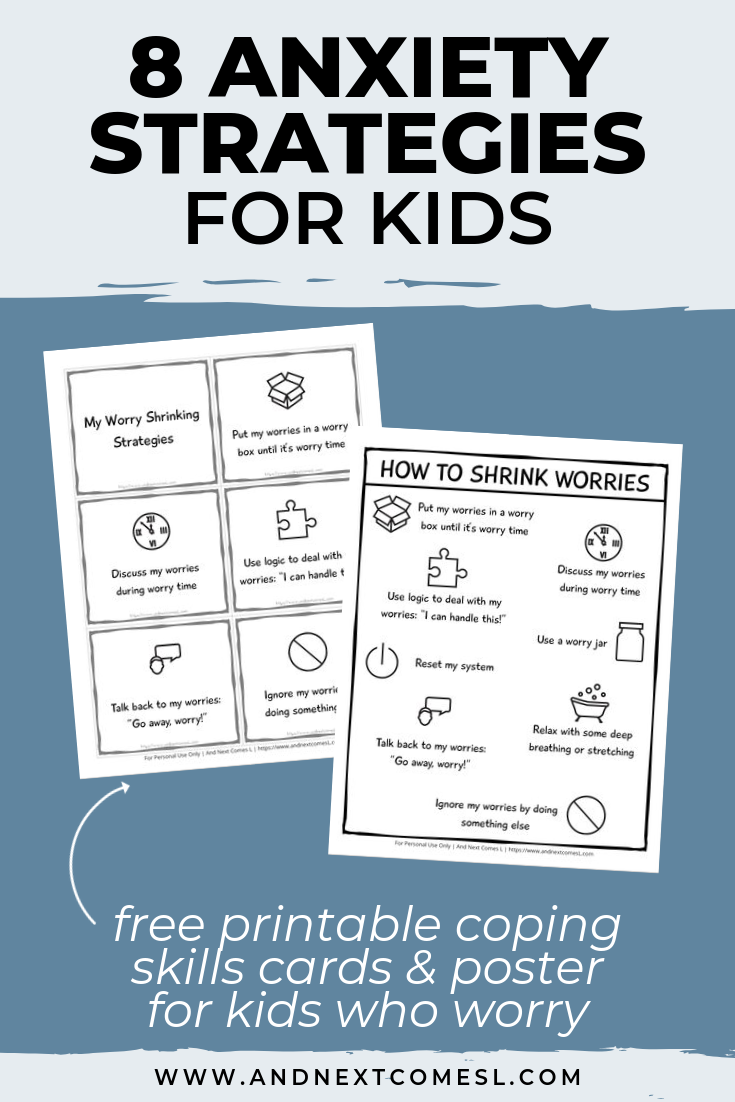Knowing how to help an anxious child is overwhelming and exhausting.
Trust me, I know because my son is highly anxious.
Thankfully, we have made huge strides this past year in helping him learn to cope with anxiety and manage his worries.
He now uses many of the anxiety strategies that I'm about to show you on his own. Yes that's right, he implements these ideas, oftentimes completely unprompted, when he starts to recognize the signs of anxiety in his body. Sometimes I'll find him on the driveway shooting hoops (distraction strategy) or doing some deep breathing (relaxation strategy) and it's wonderful!
So how did we get to this point?
Well, we started using these 8 anxiety strategies for kids.
And, of course, I've made some free printable worry cards and a poster so you can print them off and teach them to your own kids.
8 Worry Management Strategies to Teach Anxious Kids
These strategies are ones that my son learned from his psychologist. With her guidance, he wrote out a colorful list of worry shrinking strategies on a piece of lined paper one session and brought them home so he could reference the strategies as he needed them. He even added adorable little illustrations throughout. The poster turned out really cute.
So I decided to make him an official set of worry cards that he could take on the go though, which I've included below. They prompt the anxious child to use one (or multiple) of these anxiety strategies.
1. Use a worry box to put worries in
It doesn't have to be a physical box. It can be an imaginary box in your child's brain. It doesn't even have to be a box. You could try this free worry jar printable instead.
But it might be fun to let your child make and decorate their own worry box.
I also recommend teaching your child about the worry box by reading the book The Worry Box by Suzanne Chiew.
The idea is to put the worries in the box and put those worrying thoughts away until it's worry time, which leads me to the next strategy...
2. Discuss worries during worry time
Worry time is an incredibly powerful strategy to help kids with their anxious thoughts. It teaches them to gain control over their worries. You can learn more about the worry time technique here.
3. Use logic to deal with worries
This strategy is all about fighting back against those worries by showing them that your child can either handle what's coming their way or that the possibility of their worry coming true is slim.
It's about saying, "I can handle this" or "This won't happen."
Here's an example of how my son used logic to manage his worries about the rain (he has anxiety about weather, in particular rain and hail). So when we started biking home from school and it started to rain on us, he started to freak out. We biked faster and faster to try to get home, but halfway home, he used logic on his own to declare, "You know, rain is just water. I can do this." And he's right. He could. And he did. I was so incredibly proud of him!
4. Talk back to the worries
"Go away, worry!"
Flick and stomp.
"I don't need you right now."
These are all different ways to talk back to the worries that my son enjoys.
You could also encourage your child to name their worry bully so that they can talk back directly to that bully. Your child can use this free printable worry bully sheet to name and draw their worry bully.
5. Ignore the worry
This strategy is all about distracting yourself so you can ignore the anxious thoughts. Your child might want to draw, listen to music, or exercise.
6. Reset the system
You know when a video game freezes and you have to hit the reset button? Or you don't like the show that's playing on TV so you change the channel? Well, this anxiety strategy is the same thing.
This strategy is all about changing the channel in your mind. Instead of thinking about the anxious thoughts, your child needs to try to visualize something positive that they enjoy.
My son has decided that to reset his system, he needs to think about the World Waterpark in Edmonton, a place he absolutely loves. I believe he even has it on a specific channel in his mind. I forget which channel number, but I'm going to guess it's 36 since that's a favorite number of his.
7. Relax and calm the body
This strategy is all about doing some deep breathing, stretching, or similar to help your child relax and calm their body. Here are 5 deep breathing exercises you could teach your child.
8. Use a worry jar
Worry jar, glitter jar, sensory bottle...there's lots of different names for this coping strategy. The idea is to shake up all your worries (aka the glitter in the worry jar) and watch your worries slowly fall to the bottom (aka watch the glitter slowly settle).
Here are some sensory bottle ideas you could try using as a worry jar:





